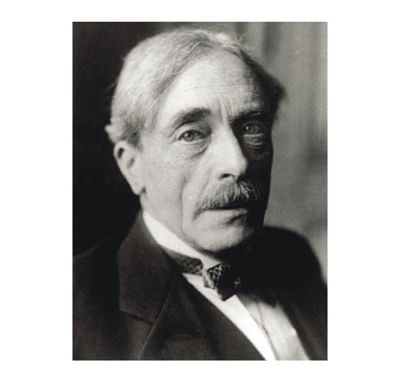Remembering Paul Valéry

July is not only the month of the Fall of the Bastille but of the death of Paul Valéry (30 October 1871-20 July 1945) as well. He was not only a poet and essayist of rare talent, but also a rigorous and passionate explorer of thought who devoted his life to both literature and science. Though known as a poet, Paul Valéry also wrote essays and aphorisms on art, history, letters, music and current events. His interests were so sufficiently broad that he can be classified as a polymath.
It is interesting to note that none of his poems drew much attention till 1892, when Valéry underwent an existential crisis, an event that had a huge impact on his writing career. La Soirée avec monsieur Teste (An evening with Mr. Teste) appeared in 1896. The protagonist, Monsieur Teste, is nothing but an allegorical representation of self-consciousness. In many ways he resembles the author, yet Teste does not represent the whole of Valéry, who not only knew what rapture and folly were, but also proclaimed their virtues.
It is difficult to understand Paul Valéry's spiritual and aesthetic evolution without considering his youth. Until age twenty, the writer had kept his childhood faith. He was a precocious author whose perfect verses were well received by the literary avant garde in France. The young Valéry also greatly admired Stéphane Mallarmé, leading figure of French symboliste poetry. Answering a letter that Valéry had sent him, Mallarmé wrote, "My dear poet, with your gift for subtle analogy and your time sense of music you have all that is essential."
The young writer, with a passion for Mme. de Rovira that totally unsettled him, decided to free himself from the "idols" of love and poetry, and henceforth devote himself solely to the intellect, to understanding what consciousness and knowledge were. This awakening is fundamental to Paul Valéry's writing, which is an attempt to make a science out of the workings of the mind.
Paul Valéry's most striking achievement is perhaps his monumental intellectual diary (over 20,000 pages) called the Cahiers (Notebooks). Two years after this mystical experience, he moved to Paris and resided there for most of the remainder of his life. Every morning, at dawn, he began writing his famous Cahiers, which remained secret until his death and were published twelve years after his death. Every morning he contributed something to the Cahiers, prompting him to write: "Having dedicated those hours to the life of the mind, I thereby earn the right to be stupid for the rest of the day." These large notebooks, that included sketches and figures, clearly reveal their author's intent: "to advance towards knowledge, through a multitude of questions and precautions." For Paul Valéry, who once wrote "I am quick or I am nothing", virtuosity can only be acquired through a slow and long process of learning and apprenticeship. In this methodical exploration of the spirit lies Valéry's secret.
Paul Valéry sought a creative unity of mind and found it in Leonardo da Vinci, who had the rare capacity to combine both a scientific and artistic spirit. He found inspiration in the Italian master through L' Introduction á La Méthode de Léonard de Vinci (An Introduction to the Method of Leonardo de Vinci) in 1895. He became familiar with painters like Edgar Degas, Odilon Redon and Edourd Vuillard, and with the writer Jean Cocteau as well.
Paul Valéry's technique is quite orthodox in its essentials. His verse rhymes and scans in conventional ways, and it has much in common with the work of his mentor Mallarmé. When, in 1913, the Parisian publisher Gallimard requested poems of Paul Valéry, he wrote La Jeune Parque (The Young Fate) that resulted in a short masterpiece. He finally broke his 'great silence' with the publication of this obscure, but sublimely musical, masterpiece of 512 alexandrine lines in rhyming couplets, which had taken him four years to complete and proved to be an enormous success in 1917. Such lyricism is bound to have an effect for this is about the drama of our lives, about how our reason and mind say one thing and our innermost feelings another. His verses have the transparency of purity and the profundity of meaning. However, it is also possible to read the poem as an allegory on the way fate moves human affairs or as an attempt to comprehend the horrific violence in Europe at the time of the poem's composition. Though it is not about World War I, it does try to address the relationship between destruction and beauty.
In 1920 and 1922, encouraged by the success of La Jeune Parque, Paul Valéry published several works in rapid succession: Le Cimetière marin (The Graveyard by the Sea) and Odes and L'Album des vers anciens (Album of Ancient Verses), Charmes (from the Latin carmina, meaning "songs" and also "incantations"), which further confirmed his reputation as a major French poet.
Paul Valéry went on writing till the end of his life. Though he had no great penchant for the genre, he felt the temptation to write a "cerebral and sensual novel", the fragments of which constitute Histories Barisées (Broken Histories). In four collections of essays, entitled Variété (Variety, 1922-1944), he presented his philosophical considerations, his reflections on poetry, music and art, his thoughts on science and civilization, and the future of Europe, conveying the deep moral crisis that the continent experienced after World War I.
Paul Valéry was elected a member of the Académic Francsaise in 1925. He became a tireless public speaker and intellectual figure in French society. He represented France on cultural matters at the League of Nations. In 1937, he was given a chair at the Collège de France, which was the first time ever that a poet and essayist received such an honour. In the year of his death, he was still working on a prose poem, L'Ange (The Angel), and his play Mon Faust (My Faust) was published. Paul Valéry died in Paris on 20 July 1945. A state funeral was held for this great figure of France. He was later buried in the cemetery of his native town, Sète, the cemetery celebrated in his famous poem, Le Cimetière marin.

 For all latest news, follow The Daily Star's Google News channel.
For all latest news, follow The Daily Star's Google News channel. 



Comments